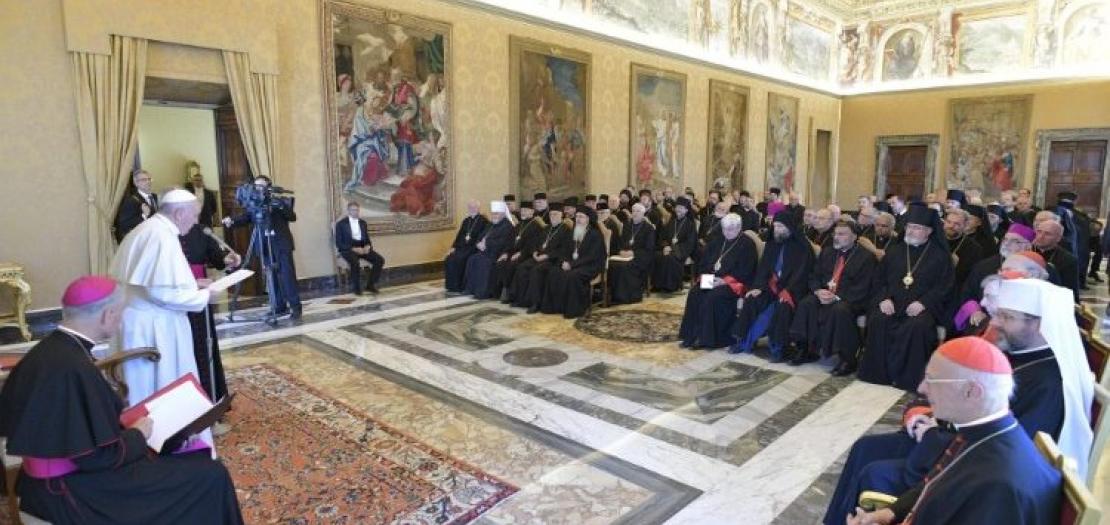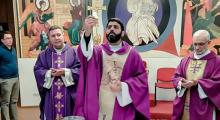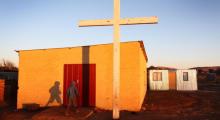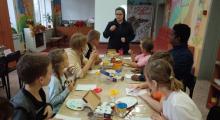Issued by the Catholic Center for Studies and Media - Jordan. Editor-in-chief Fr. Rif'at Bader - موقع أبونا abouna.org

Pope Francis on 14 September received in audience some 40 bishop of Oriental Catholic Churches of Europe at the end of their annual meeting in Rome.
In the face of inequalities and divisions that threaten peace, we feel called to be artisans of dialogue, promoters of reconciliation and patient builders of a civilization of encounter that can preserve our times from the incivility of conflict. Pope Francis made this exhortation to some 40 Oriental Catholic bishops of Europe whom he received in audience in the Vatican on Saturday.
“While so many people allow themselves to be caught up in a spiral of violence, in a vicious circle of demands and constant mutual recriminations, the Lord wants us to be meek sowers of the Gospel of love,” the Pope told the bishops who met him at the end of their 22nd annual meeting in Rome from 11 to 14 September, on the theme, “The Ecumenical Mission of Oriental Catholic Churches of Europe Today”.
“I feel that the way shown to us from on high is made up of prayer, humility and love,” the Pope told the bishops, noting they are committed to healing the wounds of the past, overcoming prejudices and divisions, and offering hope to all as they walk side by side on an ecumenical journey alongside their non-Catholic brothers and sisters.
Noting that among the bishops there were some from the Byzantine tradition, the Middle East, India and other regions, the Pope cited the Second Vatican Council saying, “variety within the Church in no way harms its unity; rather it manifests it.” In fact, he said, Christian unity is not uniformity. Uniformity, he stressed, is the destruction of unity. Instead, Christian truth is “symphonic”, or else there would be no Holy Spirit.
Communion with the Catholic Church, the Pope pointed out, in no way detracts from their particular identity. Rather, their communion should contribute to the full realization of their identity, for example, by protecting it from the temptation of closing in on itself and falling into national or ethnic particularisms that exclude others. The danger of our civilization the Pope said is “particularism that becomes populism that seeks to command and make everything uniform”.
Underscoring the richness of the spirituality, liturgy and theology of their Orthodox roots, the Holy Father urged them to further it in the academic world. Above all, he urged them to help each other “live in love with all”, saying, “love knows no canonical or jurisdictional boundaries”. The Holy Father said he feels pained to see a struggle for jurisdictions among Catholics.
“When we bend over a suffering brother or sister; when we become neighbours to those who endure loneliness and poverty; when we put at the centre the marginalized – children who will not see the light of day, young people deprived of hope, families tested by being broken, or sick or elderly persons who are cast aside,” the Pope said, “we are already walking together in the love that heals divisions.”
At the end, the Pope said, the Lord will not seek an account from us of our territories, jurisdiction or our contribution to the development of our national identities. “Instead, He will ask how much we loved our neighbour, every neighbour, and how well we were able to proclaim the Gospel of salvation to those we met along the road of life.”
Warning particularly against the “poison” of the attachment to money, the Pope urged the bishops in the love of God and neighbour, saying in it we find joy and spread hope.
The followers of Christ were united in the beginning, but growing tensions from the 5th to the 11th century between the Byzantine Church, based in Constantinople, and the Rome-based Catholic Church, culminated in the Great Schism of 1054, that split the followers of Christ into Eastern Orthodoxy and Western Catholicism.
Today, there are 23 “sui iuris” Eastern Catholic Churches or Oriental Catholic Churches, also called the Eastern-rite Catholic Churches, that are in full communion with the Pope in Rome, as part of the worldwide Catholic Church.







